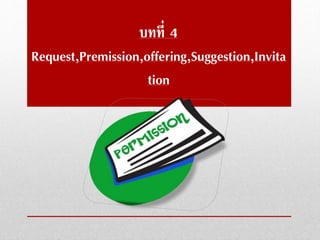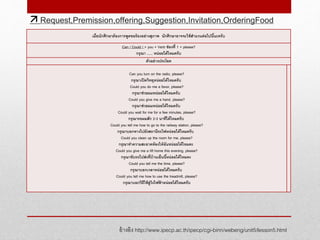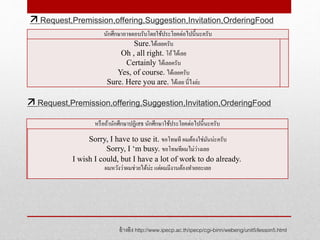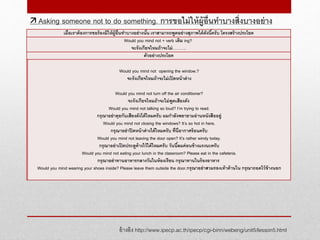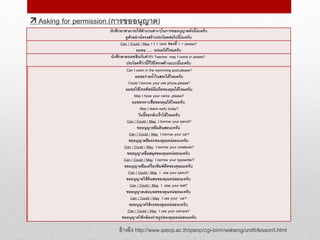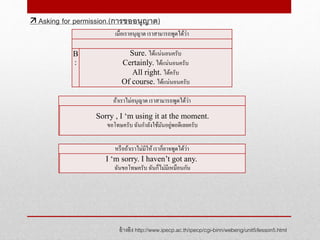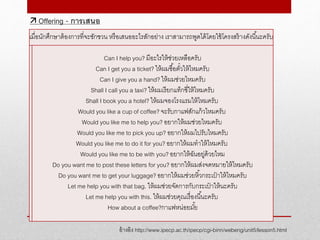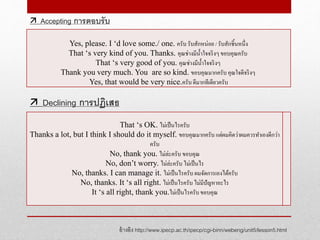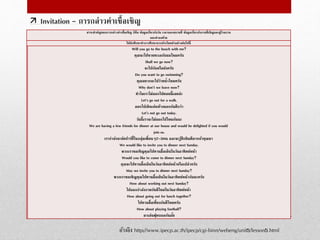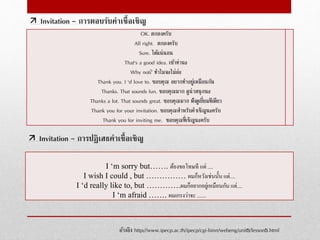аё аёІаё©аёІаёӯаёұаёҮаёҒаёӨаё©а№Җаёһаё·а№ҲаёӯаёҒаёІаёЈаёӘаё·а№ҲаёӯаёӘаёІаёЈ аёҡаё—аё—аёөа№Ҳ 4
- 2. аёӯа№үаёІаёҮаёӯаёҙаёҮ http://www.ipecp.ac.th/ipecp/cgi-binn/webeng/unit5/lesson5.html пғ– Request,Premission,offering,Suggestion,Invitation,OrderingFood а№ҖаёЎаё·а№ҲаёӯаёҷаёұаёҒаёЁаё¶аёҒаё©аёІаё•а№үаёӯаёҮаёҒаёІаёЈаёһаё№аё”аёӮаёӯаёЈа№үаёӯаёҮаёӯаёўа№ҲаёІаёҮаёӘаёёаё аёІаёһ аёҷаёұаёҒаёЁаё¶аёҒаё©аёІаёӯаёІаёҲаёҲаё°а№ғаёҠа№үаёӘаёІаёҷаё§аёҷаё•а№Ҳаёӯไаёӣаёҷаёөа№үаёҷаё°аё„аёЈаёұаёҡ Can / Could / + you + Verb аёҠа№ҲаёӯаёҮаё—аёөа№Ҳ 1 + please? аёҒаёЈаёёаё“аёІ ...... аё«аёҷа№Ҳаёӯยไดа№үไหมครаёұаёҡ аё•аёұаё§аёӯаёўа№ҲаёІаёҮаёӣаёЈаё°а№Ӯаёўаё„ Can you turn on the radio, please? аёҒаёЈаёёаё“аёІа№Җаёӣаёҙаё”аё§аёҙаё—аёўаёёаё«аёҷа№Ҳаёӯยไดа№үไหมครаёұаёҡ Could you do me a favor, please? аёҒаёЈаёёаё“аёІаёҠа№Ҳаё§аёўаёңаёЎаё«аёҷа№Ҳаёӯยไดа№үไหมครаёұаёҡ Could you give me a hand, please? аёҒаёЈаёёаё“аёІаёҠа№Ҳаё§аёўаёңаёЎаё«аёҷа№Ҳаёӯยไดа№үไหมครаёұаёҡ Could you wait for me for a few minutes, please? аёҒаёЈаёёаё“аёІаёЈаёӯаёңаёЎаёӘаёұаёҒ 2-3 аёҷаёІаё—аёөไดа№үไหมครаёұаёҡ Could you tell me how to go to the railway station, please? аёҒаёЈаёёаё“аёІаёҡаёӯаёҒаё—аёІаёҮไаёӣаёўаёұаёҮаёӘаё–аёІаёҷаёөรถไаёҹаё«аёҷа№Ҳаёӯยไดа№үไหมครаёұаёҡ Could you clean up the room for me, please? аёҒаёЈаёёаё“аёІаё—аёІаё„аё§аёІаёЎаёӘаё°аёӯаёІаё”аё«а№үаёӯаёҮа№ғаё«а№үаёүаёұаёҷаё«аёҷа№Ҳаёӯยไดа№үไหมคะ Could you give me a lift home this evening, please? аёҒаёЈаёёаё“аёІаёӮаёұаёҡรถไаёӣаёӘа№ҲаёҮаё—аёөа№Ҳаёҡа№үаёІаёҷа№Җаёўа№Үаёҷаёҷаёөа№үаё«аёҷа№Ҳаёӯยไดа№үไหมคะ Could you tell me the time, please? аёҒаёЈаёёаё“аёІаёҡаёӯаёҒа№Җаё§аёҘаёІаё«аёҷа№Ҳаёӯยไดа№үไหมครаёұаёҡ Could you tell me how to use the treadmill, please? аёҒаёЈаёёаё“аёІаёҡаёӯаёҒаё§аёҙаёҳаёөа№ғаёҠа№үаёҘаё№а№Ҳаё§аёҙаёҮไаёҹаёҹа№ү аёІаё«аёҷа№Ҳаёӯยไดа№үไหมครаёұаёҡ
- 3. аёҷаёұаёҒаёЁаё¶аёҒаё©аёІаёӯаёІаёҲаё•аёӯаёҡаёЈаёұаёҡа№Ӯаё”аёўа№ғаёҠа№үаёӣаёЈаё°а№Ӯаёўаё„аё•а№Ҳаёӯไаёӣаёҷаёөа№үаёҷаё°аё„аёЈаёұаёҡ Sure.ไดа№үа№ҖаёҘаёўаё„аёЈаёұаёҡ Oh , all right. а№Ӯаёӯа№үไดа№үа№ҖаёҘаёў Certainly ไดа№үа№ҖаёҘаёўаё„аёЈаёұаёҡ Yes, of course. ไดа№үа№ҖаёҘаёўаё„аёЈаёұаёҡ Sure. Here you are. ไดа№үа№ҖаёҘаёў аёҷаёөа№ҲไаёҮаёҘа№Ҳаё° аёӯа№үаёІаёҮаёӯаёҙаёҮ http://www.ipecp.ac.th/ipecp/cgi-binn/webeng/unit5/lesson5.html пғ– Request,Premission,offering,Suggestion,Invitation,OrderingFood пғ– Request,Premission,offering,Suggestion,Invitation,OrderingFood аё«аёЈаё·аёӯаё–а№үаёІаёҷаёұаёҒаёЁаё¶аёҒаё©аёІаёӣаёҸаёҙа№ҖаёӘаёҳ аёҷаёұаёҒаёЁаё¶аёҒаё©аёІа№ғаёҠа№үаёӣаёЈаё°а№Ӯаёўаё„аё•а№Ҳаёӯไаёӣаёҷаёөа№үаёҷаё°аё„аёЈаёұаёҡ Sorry, I have to use it. аёӮаёӯа№Ӯаё—аё©аё—аёө аёңаёЎаё•а№үаёӯаёҮа№ғаёҠа№ҲаёЎаёұаёҷаёҷа№Ҳаё°аё„аёЈаёұаёҡ Sorry, I вҖҳm busy. аёӮаёӯа№Ӯаё—аё©аё—аёөаёңมไมа№Ҳаё§а№ҲаёІаёҮа№ҖаёҘаёў I wish I could, but I have a lot of work to do already. аёңаёЎаё«аё§аёұаёҮаё§а№ҲаёІаёңаёЎаёҠа№Ҳวยไดа№үаёҷа№Ҳаё°а№Ғаё•а№ҲаёңаёЎаёЎаёөаёҮаёІаёҷаё•а№үаёӯаёҮаё—аёІа№Җаёўаёӯаё°а№ҖаёҘаёў
- 4. аёӯа№үаёІаёҮаёӯаёҙаёҮ http://www.ipecp.ac.th/ipecp/cgi-binn/webeng/unit5/lesson5.html пғ– Asking someone not to do something. аёҒаёІаёЈаёӮаёӯไมа№Ҳа№ғаё«а№үаёңаё№а№үаёӯаё·а№Ҳаёҷаё—аёІаёҡаёІаёҮаёӘаёҙа№ҲаёҮаёҡаёІаёҮаёӯаёўа№ҲаёІаёҮ а№ҖаёЎаё·а№Ҳаёӯа№ҖаёЈаёІаё•а№үаёӯаёҮаёҒаёІаёЈаёӮаёӯаёЈа№үаёӯаёҮаёЎаёҙа№ғаё«а№үаёңаё№а№үаёӯаё·а№Ҳаёҷаё—аёІаёҡаёІаёҮаёӯаёўа№ҲаёІаёҮаёҷаёұа№үаёҷ а№ҖаёЈаёІаёӘаёІаёЎаёІаёЈаё–аёһаё№аё”аёӯаёўа№ҲаёІаёҮаёӘаёёаё аёІаёһไดа№үаё”аёұаёҮаёҷаёөа№үаё„аёЈаёұаёҡ а№Ӯаё„аёЈаёҮаёӘаёЈа№үаёІаёҮаёӣаёЈаё°а№Ӯаёўаё„ Would you mind not + verb а№Җаё•аёҙаёЎ ing? аёҲаё°аёЈаёұаёҮа№ҖаёҒаёөаёўаёҲไหมถа№үаёІаёҲะไมа№ҲвҖҰвҖҰвҖҰ. аё•аёұаё§аёӯаёўа№ҲаёІаёҮаёӣаёЈаё°а№Ӯаёўаё„ Would you mind not opening the window.? аёҲаё°аёЈаёұаёҮа№ҖаёҒаёөаёўаёҲไหมถа№үаёІаёҲะไมа№Ҳа№Җаёӣаёҙаё”аё«аёҷа№үаёІаё•а№ҲаёІаёҮ Would you mind not turn off the air conditioner? аёҲаё°аёЈаёұаёҮа№ҖаёҒаёөаёўаёҲไหมถа№үаёІаёҲะไมа№Ҳаёһаё№аё”а№ҖаёӘаёөаёўаёҮаё”аёұаёҮ Would you mind not talking so loud? IвҖҷm trying to read. аёҒаёЈаёёаё“аёІаёӯаёўа№ҲаёІаё„аёёаёўаёҒаёұаёҷа№ҖаёӘаёөаёўаёҮаё”аёұаёҮไดа№үไหมครаёұаёҡ аёңаёЎаёҒаёІаёҘаёұаёҮаёһаёўаёІаёўаёІаёЎаёӯа№ҲаёІаёҷаё«аёҷаёұаёҮаёӘаё·аёӯаёӯаёўаё№а№Ҳ Would you mind not closing the windows? ItвҖҷs so hot in here. аёҒаёЈаёёаё“аёІаёӯаёўа№ҲаёІаёӣаёҙаё”аё«аёҷа№үаёІаё•а№ҲаёІаёҮไดа№үไหมครаёұаёҡ аё—аёөа№Ҳаёҷаёөа№ҲаёӯаёІаёҒаёІаёЁаёЈа№үаёӯаёҷаё„аёЈаёұаёҡ Would you mind not leaving the door open? ItвҖҷs rather windy today. аёҒаёЈаёёаё“аёІаёӯаёўа№ҲаёІа№Җаёӣаёҙаё”аёӣаёЈаё°аё•аё№аё„а№үаёІаёҮไวа№үไดа№үไหมครаёұаёҡ аё§аёұаёҷаёҷаёөа№үаёҘаёЎаё„а№ҲаёӯаёҷаёӮа№үаёІаёҮа№ҒаёЈаёҮаёҷаё°аё„аёЈаёұаёҡ Would you mind not eating your lunch in the classroom? Please eat in the cafeteria. аёҒаёЈаёёаё“аёІаёӯаёўа№ҲаёІаё—аёІаёҷаёӯаёІаё«аёІаёЈаёҒаёҘаёІаёҮаё§аёұаёҷа№ғаёҷаё«а№үаёӯаёҮа№ҖаёЈаёөаёўаёҷ аёҒаёЈаёёаё“аёІаё—аёІаёҷа№ғаёҷаёЈа№үаёӯаёҮаёӯаёІаё«аёІаёЈ Would you mind wearing your shoes inside? Please leave them outside the door.аёҒаёЈаёёаё“аёІаёӯаёўа№ҲаёІаёӘаё§аёЎаёЈаёӯаёҮа№Җаё—а№үаёІаё”а№үаёІаёҷа№ғаёҷ аёҒаёЈаёёаё“аёІаё–аёӯดไวа№үаёӮа№үаёІаёҮаёҷаёӯаёҒ
- 5. Sure.ไดа№үа№ҖаёҘаёўаё„аёЈаёұаёҡ Oh , all right. а№Ӯаёӯа№ү ไดа№үа№ҖаёҘаёў Not at all. ไมа№Ҳа№Җаёӣа№Ү аёҷไรครаёұаёҡ Of course not.ไมа№ҲаёЈаёұаёҮа№ҖаёҒаёөаёўаёҲаё„аёЈаёұаёҡ All right. ไมа№Ҳа№Җаёӣа№Ү аёҷไรครаёұаёҡ Certainly.ไดа№үа№ҖаёҘаёўаё„аёЈаёұаёҡ аёӯа№үаёІаёҮаёӯаёҙаёҮ http://www.ipecp.ac.th/ipecp/cgi-binn/webeng/unit5/lesson5.html пғ– аёҒаёІаёЈаё•аёӯаёҡаёЈаёұаёҡ
- 6. аёӯа№үаёІаёҮаёӯаёҙаёҮ http://www.ipecp.ac.th/ipecp/cgi-binn/webeng/unit5/lesson5.html пғ– Asking for permission.(аёҒаёІаёЈаёӮаёӯаёӯаёҷаёёаёҚаёІаё•) аёҷаёұаёҒаёЁаё¶аёҒаё©аёІаёӘаёІаёЎаёІаёЈаё–а№ғаёҠа№үаёӘаёІаёҷаё§аёҷаё•а№ҲаёІаёҮа№Ҷа№ғаёҷаёҒаёІаёЈаёӮаёӯаёӯаёҷаёёаёҚаёІаё•аё”аёұаёҮаёҷаёөа№үаёҷа№Ҳаё°аё„аёЈаёұаёҡ аё”аё№аё•аёұаё§аёӯаёўа№ҲаёІаёҮа№Ӯаё„аёЈаёҮаёӘаёЈа№үаёІаёҮаёӣаёЈаё°а№Ӯаёўаё„аё•а№Ҳаёӯไаёӣаёҷаёөа№үаёҷа№Ҳаё°аё„аёЈаёұаёҡ Can / Could / May + I + Verb аёҠа№ҲаёӯаёҮаё—аёөа№Ҳ 1 + please? аёңаёЎаёӮаёӯ ...... аё«аёҷа№Ҳаёӯยไดа№үไหมครаёұаёҡ аёҷаёұаёҒаёЁаё¶аёҒаё©аёІаё„аёҮа№Җаё„аёўаёҠаёҙаёҷаёҒаёұаёҡаё„аёІаё§а№ҲаёІ Teacher, may I come in please? аёӣаёЈаё°а№Ӯаёўаё„аё—аёөа№Ҳаё§а№ҲаёІаёҷаёөа№үаёҒа№Үа№ғаёҠа№үа№Ӯаё„аёЈаёҮаёӘаёЈа№үаёІаёҮа№Ғаёҡаёҡаёҷаёөа№үаёҷаё°аё„аёЈаёұаёҡ Can I swim in the swimming pool,please? аёңаёЎаёӮаёӯаё§а№ҲаёІаёўаёҷа№үаёІа№ғаёҷаёӘระไดа№үไหมครаёұаёҡ Could I borrow your cell phone,please? аёңаёЎаёӮаёӯа№ғаёҠа№үа№Ӯаё—аёЈаёЁаёұаёһаё—а№ҢаёЎаё·аёӯаё–аё·аёӯаёӮаёӯаёҮคุณไดа№үไหมครаёұаёҡ May I have your name ,please? аёңаёЎаёӮаёӯаё—аёЈаёІаёҡаёҠаё·а№ҲаёӯаёӮаёӯаёҮคุณไดа№үไหมครаёұаёҡ May I leave early today? аё§аёұаёҷаёҷаёөа№үаёӮаёӯаёҒаёҘаёұаёҡа№ҖаёЈа№Үวไดа№үไหมครаёұаёҡ Can / Could / May I borrow your pencil? аёӮаёӯаёӯаёҷаёёаёҚаёІаё•аёўаё·аёЎаё”аёҙаёҷаёӘаёӯаёҷаё°аё„аёЈаёұаёҡ Can / Could / May I borrow your car? аёӮаёӯаёӯаёҷаёёаёҚаёІаё•аёўаё·аёЎаёЈаё–аёӮаёӯаёҮаё„аёёаё“аё«аёҷа№Ҳаёӯаёўаёҷаё°аё„аёЈаёұаёҡ Can / Could / May I borrow your notebook? аёӮаёӯаёӯаёҷаёёаёҚаёІаё•аёўаё·аёЎаёӘаёЎаёёаё”аёӮаёӯаёҮаё„аёёаё“аё«аёҷа№Ҳаёӯаёўаёҷаё°аё„аёЈаёұаёҡ Can / Could / May I borrow your typewriter? аёӮаёӯаёӯаёҷаёёаёҚаёІаё•аёўаё·аёЎа№Җаё„аёЈаё·а№ҲаёӯаёҮаёһаёҙаёЎаёһа№Ңаё”аёөаё”аёӮаёӯаёҮаё„аёёаё“аёҷаё°аё„аёЈаёұаёҡ Can / Could / May I use your pencil? аёӮаёӯаёӯаёҷаёёаёҚаёІаё•а№ғаёҠа№үаё”аёҙаёҷаёӘаёӯаёӮаёӯаёҮаё„аёёаё“аё«аёҷа№Ҳаёӯаёўаёҷаё°аё„аёЈаёұаёҡ Can / Could / May I play your ball? аёӮаёӯаёӯаёҷаёёаёҚаёІаё•а№ҖаёҘа№ҲаёҷаёҡаёӯаёҘаёӮаёӯаёҮаё„аёёаё“аё«аёҷа№Ҳаёӯаёўаёҷаё°аё„аёЈаёұаёҡ Can / Could / May I use your car? аёӮаёӯаёӯаёҷаёёаёҚаёІаё•а№ғаёҠа№үаёЈаё–аёӮаёӯаёҮаё„аёёаё“аё«аёҷа№Ҳаёӯаёўаёҷаё°аё„аёЈаёұаёҡ Can / Could / May I use your camera? аёӮаёӯаёӯаёҷаёёаёҚаёІаё•а№ғаёҠа№үаёҒаёҘа№үаёӯаёҮаё–а№ҲаёІаёўаёЈаё№аёӣаёӮаёӯаёҮаё„аёёаё“аё«аёҷа№Ҳаёӯаёўаёҷаё°аё„аёЈаёұаёҡ
- 7. аёӯа№үаёІаёҮаёӯаёҙаёҮ http://www.ipecp.ac.th/ipecp/cgi-binn/webeng/unit5/lesson5.html пғ– Asking for permission.(аёҒаёІаёЈаёӮаёӯаёӯаёҷаёёаёҚаёІаё•) а№ҖаёЎаё·а№Ҳаёӯа№ҖаёЈаёІаёӯаёҷаёёаёҚаёІаё• а№ҖаёЈаёІаёӘаёІаёЎаёІаёЈаё–аёһูดไดа№үаё§а№ҲаёІ B : Sure. ไดа№үа№Ғаёҷа№Ҳаёҷаёӯаёҷаё„аёЈаёұаёҡ Certainly. ไดа№үа№Ғаёҷа№Ҳаёҷаёӯаёҷаё„аёЈаёұаёҡ All right. ไดа№үаё„аёЈаёұаёҡ Of course. ไดа№үа№Ғаёҷа№Ҳаёҷаёӯаёҷаё„аёЈаёұаёҡ аё–а№үаёІа№Җราไมа№ҲаёӯаёҷаёёаёҚаёІаё• а№ҖаёЈаёІаёӘаёІаёЎаёІаёЈаё–аёһูดไดа№үаё§а№ҲаёІ Sorry , I вҖҳm using it at the moment. аёӮаёӯа№Ӯаё—аё©аё„аёЈаёұаёҡ аёүаёұаёҷаёҒаёІаёҘаёұаёҮа№ғаёҠа№үаёЎаёұаёҷаёӯаёўаё№а№Ҳаёһаёӯаё”аёөа№ҖаёҘаёўаё„аёЈаёұаёҡ аё«аёЈаё·аёӯаё–а№үаёІа№Җราไมа№ҲаёЎаёөа№ғаё«а№үа№ҖаёЈаёІаёҒа№ҮаёӯаёІаёҲаёһูดไดа№үаё§а№ҲаёІ I вҖҳm sorry. I havenвҖҷt got any. аёүаёұаёҷаёӮаёӯа№Ӯаё—аё©аё„аёЈаёұаёҡ аёүаёұаёҷаёҒа№Үไมа№ҲаёЎаёөа№Җаё«аёЎаё·аёӯаёҷаёҒаёұаёҷ
- 8. аёӯа№үаёІаёҮаёӯаёҙаёҮ http://www.ipecp.ac.th/ipecp/cgi-binn/webeng/unit5/lesson5.html пғ– Offering - аёҒаёІаёЈа№ҖаёӘаёҷаёӯ а№ҖаёЎаё·а№ҲаёӯаёҷаёұаёҒаёЁаё¶аёҒаё©аёІаё•а№үаёӯаёҮаёҒаёІаёЈаё—аёөа№ҲаёҲаё°аёҠаёұаёҒаёҠаё§аёҷ аё«аёЈаё·аёӯа№ҖаёӘаёҷаёӯаёӯะไรаёӘаёұаёҒаёӯаёўа№ҲаёІаёҮ а№ҖаёЈаёІаёӘаёІаёЎаёІаёЈаё–аёһูดไดа№үа№Ӯаё”аёўа№ғаёҠа№үа№Ӯаё„аёЈаёҮаёӘаёЈа№үаёІаёҮаё”аёұаёҮаёҷаёөа№үаёҷаё°аё„аёЈаёұаёҡ Can I help you? аёЎаёөаёӯะไรа№ғаё«а№үаёҠа№Ҳаё§аёўа№Җаё«аёҘаё·аёӯаё„аёЈаёұаёҡ Can I get you a ticket? а№ғаё«а№үаёңаёЎаёӢаё·а№үаёӯаё•аёұа№Ӣаё§а№ғаё«а№үไหมครаёұаёҡ Can I give you a hand? а№ғаё«а№үаёңаёЎаёҠа№Ҳวยไหมครаёұаёҡ Shall I call you a taxi? а№ғаё«а№үаёңаёЎа№ҖаёЈаёөаёўаёҒа№Ғаё—а№ҮаёҒаёӢаёөа№Ҳа№ғаё«а№үไหมครаёұаёҡ Shall I book you a hotel? а№ғаё«а№үаёңаёЎаёҲаёӯаёҮа№ӮаёЈаёҮа№ҒаёЈаёЎа№ғаё«а№үไหมครаёұаёҡ Would you like a cup of coffee? аёҲаё°аёЈаёұаёҡаёҒаёІа№ҒаёҹаёӘаёұаёҒа№ҒаёҒа№үวไหมครаёұаёҡ Would you like me to help you? аёӯаёўаёІаёҒа№ғаё«а№үаёңаёЎаёҠа№Ҳวยไหมครаёұаёҡ Would you like me to pick you up? аёӯаёўаёІаёҒа№ғаё«а№үаёңมไаёӣаёЈаёұаёҡไหมครаёұаёҡ Would you like me to do it for you? аёӯаёўаёІаёҒа№ғаё«а№үаёңаёЎаё—аёІа№ғаё«а№үไหมครаёұаёҡ Would you like me to be with you? аёӯаёўаёІаёҒа№ғаё«а№үаёүаёұаёҷаёӯаёўаё№а№Ҳаё”а№үวยไหม Do you want me to post these letters for you? аёӯаёўаёІаёҒа№ғаё«а№үаёңаёЎаёӘа№ҲаёҮаёҲаё”аё«аёЎаёІаёўа№ғаё«а№үไหมครаёұаёҡ Do you want me to get your luggage? аёӯаёўаёІаёҒа№ғаё«а№үаёңаёЎаёҠа№Ҳаё§аёўаё«аёҙа№үаё§аёҒаёЈаё°а№Җаёӣа№Ӣ аёІа№ғаё«а№үไหมครаёұаёҡ Let me help you with that bag. а№ғаё«а№үаёңаёЎаёҠа№Ҳаё§аёўаёҲаёұаё”аёҒаёІаёЈаёҒаёұаёҡаёҒаёЈаё°а№Җаёӣа№Ӣ аёІа№ғаё«а№үаёҷаё°аё„аёЈаёұаёҡ Let me help you with this. а№ғаё«а№үаёңаёЎаёҠа№Ҳаё§аёўаё„аёёаё“а№ҖаёЈаё·а№ҲаёӯаёҮаёҷаёөа№үаёҷаё°аё„аёЈаёұаёҡ How about a coffee?аёҒаёІа№Ғаёҹаё«аёҷа№ҲаёӯаёўаёЎаёұа№үаёў
- 9. аёӯа№үаёІаёҮаёӯаёҙаёҮ http://www.ipecp.ac.th/ipecp/cgi-binn/webeng/unit5/lesson5.html пғ– Accepting аёҒаёІаёЈаё•аёӯаёҡаёЈаёұаёҡ Yes, please. I вҖҳd love some./ one. аё„аёЈаёұаёҡ аёЈаёұаёҡаёӘаёұаёҒаё«аёҷа№Ҳаёӯаёў / аёЈаёұаёҡаёӘаёұаёҒаёҠаёҙа№үаёҷаё«аёҷаё¶а№ҲаёҮ That вҖҳs very kind of you. Thanks. аё„аёёаё“аёҠа№ҲаёІаёҮаёЎаёөаёҷа№үаёІа№ғаёҲаёҲаёЈаёҙаёҮа№ҶаёӮаёӯаёҡаё„аёёаё“аё„аёЈаёұаёҡ That вҖҳs very good of you. аё„аёёаё“аёҠа№ҲаёІаёҮаёЎаёөаёҷа№үаёІа№ғаёҲаёҲаёЈаёҙаёҮа№Ҷ Thank you very much. You are so kind. аёӮаёӯаёҡаё„аёёаё“аёЎаёІаёҒаё„аёЈаёұаёҡ аё„аёёаё“а№ғаёҲаё”аёөаёҲаёЈаёҙаёҮа№Ҷ Yes, that would be very nice.аё„аёЈаёұаёҡ аё”аёөаёЎаёІаёҒаё—аёөа№Җаё”аёөаёўаё§аё„аёЈаёұаёҡ пғ– Declining аёҒаёІаёЈаёӣаёҸаёҙа№ҖаёӘаёҳ That вҖҳs OK. ไมа№Ҳа№Җаёӣа№Үаёҷไรครаёұаёҡ Thanks a lot, but I think I should do it myself. аёӮаёӯаёҡаё„аёёаё“аёЎаёІаёҒаё„аёЈаёұаёҡ а№Ғаё•а№ҲаёңаёЎаё„аёҙаё”аё§а№ҲаёІаёңаёЎаё„аё§аёЈаё—аёІа№ҖаёӯаёҮаё”аёөаёҒаё§а№ҲаёІ аё„аёЈаёұаёҡ No, thank you. ไมа№ҲаёҘа№Ҳаё°аё„аёЈаёұаёҡ аёӮаёӯаёҡаё„аёёаё“ No, donвҖҷt worry. ไมа№ҲаёҘа№Ҳаё°аё„аёЈаёұаёҡ ไมа№Ҳа№Җаёӣа№Үаёҷไร No, thanks. I can manage it. ไมа№Ҳа№Җаёӣа№Үаёҷไรครаёұаёҡ аёңаёЎаёҲаёұаё”аёҒаёІаёЈа№ҖаёӯаёҮไดа№үаё„аёЈаёұаёҡ No, thanks. It вҖҳs all right. ไมа№Ҳа№Җаёӣа№Үаёҷไรครаёұаёҡ ไมа№ҲаёЎаёөаёӣаёұаёҚаё«аёІаёӯะไร It вҖҳs all right, thank you.ไมа№Ҳа№Җаёӣа№ҮаёҷไรครаёұаёҡаёӮаёӯаёҡаё„аёёаё“
- 10. аёӯа№үаёІаёҮаёӯаёҙаёҮ http://www.ipecp.ac.th/ipecp/cgi-binn/webeng/unit5/lesson5.html пғ– Suggestion - аёҒаёІаёЈа№ғаё«а№үаё„аёІа№Ғаёҷаё°аёҷаёІ аёЁаё¶аёҒаё©аёІаё—аёІаёҒаёІаёЈаёЁаё¶аёҒаё©аёІа№Ӯаё„аёЈаёҮаёӘаёЈа№үаёІаёҮаёӣаёЈаё°а№Ӯаёўаё„а№ғаёҷаёҒаёІаёЈа№ғаё«а№үаё„аёІа№Ғаёҷаё°аёҷаёІаё•а№Ҳаёӯไаёӣаёҷаёөа№үаёҷаё°аё„аёЈаёұаёҡ Structures You вҖҳd better have a rest. аё„аёёаё“аё„аё§аёЈаёһаёұаёҒаёңа№ҲаёӯаёҷаёӘаёұаёҒаё«аёҷа№Ҳаёӯаёўаё”аёөаёҒаё§а№ҲаёІаёҷа№Ҳаё°аё„аёЈаёұаёҡ Yes, I think so. аё„аёЈаёұаёҡ аёүаёұаёҷаёҒа№Үаё„аёҙаё”аё§а№ҲаёІаёҮаёұа№үаёҷа№Җаё«аёЎаё·аёӯаёҷаёҒаёұаёҷ You really should take some medicine. аё„аёёаё“аё„аё§аёЈаё—аёІаёҷаёўаёІаёӘаёұаёҒаё«аёҷа№Ҳаёӯаёўаё”аёөаёҒаё§а№ҲаёІаёҷа№Ҳаё°аё„аёЈаёұаёҡ Oh, I donвҖҷt think it вҖҳs necessary. а№Ӯаёӯа№үаёңаёЎаё„аёҙаё”аё§а№ҲаёІаёЎаёұаёҷไมа№ҲаёҲаёІа№Җаёӣа№Үаёҷаё„аёЈаёұаёҡ Perhaps you ought to give up smoking. аёҡаёІаёҮаё—аёөаё„аёёаё“аёҷа№ҲаёІаёҲаё°а№ҖаёҘаёҙаёҒаёӘаё№аёҡаёҡаёёаё«аёЈаёөа№Ҳаёҷаё°аё„аёЈаёұаёҡ Maybe I should. аёӯаёІаёҲаёҲаё°аё•а№үаёӯаёҮа№ҖаёҘаёҙаёҒаёҘа№Ҳаё° You shouldnвҖҷt lift heavy thing. คุณไมа№Ҳаё„аё§аёЈаёўаёҒаёӮаёӯаёҮаё«аёҷаёұаёҒаё„аёЈаёұаёҡ I think you вҖҳre right. аёңаёЎаё„аёҙаё”аё§а№ҲаёІаё„аёёаё“аёһаё№аё”аё–аё№аёҒаё„аёЈаёұаёҡ You had better not go to work today. คุณไมа№Ҳไаёӣаё—аёІаёҮаёІаёҷаёҲаё°аё”аёөаёҒаё§а№ҲаёІаёҷаё°аё§аёұаёҷаёҷаёөа№ү I guess so.аёңаёЎаёҒа№Үаё„аёҙаё”аё§а№ҲаёІаёҮаёұа№үаёҷа№Ғаё«аёҘаё°
- 11. пғ– Invitation - аёҒаёІаёЈаёҒаёҘа№ҲаёІаё§аё„аёІа№ҖаёҠаё·а№үаёӯа№ҖаёҠаёҙаёҚ аёӯа№үаёІаёҮаёӯаёҙаёҮ http://www.ipecp.ac.th/ipecp/cgi-binn/webeng/unit5/lesson5.html аёӘаёІаёЈаё°аёӘаёІаё„аёұаёҚаёӮаёӯаёҮаёҒаёІаёЈаёҒаёҘа№ҲаёІаё§аё„аёІа№ҖаёҠаё·а№үаёӯа№ҖаёҠаёҙаёҚ аёҒа№Үаё„аё·аёӯ аёӮа№үаёӯаёЎаё№аёҘа№ҖаёҒаёөа№Ҳаёўаё§аёҒаёұаёҡаё§аёұаёҷ а№Җаё§аёҘаёІа№ҒаёҘаё°аёӘаё–аёІаёҷаё—аёөа№Ҳ аёӮа№үаёӯаёЎаё№аёҘа№ҖаёҒаёөа№Ҳаёўаё§аёҒаёұаёҡаёҮаёІаёҷаё—аёөа№Ҳа№ҖаёҠаёҙаёҚа№ҒаёҘаё°аёңаё№а№үаёЈа№Ҳаё§аёЎаёҮаёІаёҷ а№ҒаёҘаё°аё„аёІаёҘаёҮаё—а№үаёІаёў а№ғаё«а№үаёҷаёұаёҒаёЁаё¶аёҒаё©аёІаё—аёІаёҒаёІаёЈаёЁаё¶аёҒаё©аёІаёҲаёІаёҒаёӣаёЈаё°а№Ӯаёўаё„аё•аёұаё§аёӯаёўа№ҲаёІаёҮаё•а№Ҳаёӯไаёӣаёҷаёөа№ү Will you go to the beach with me? аё„аёёаё“аёҲะไаёӣаёҠаёІаёўаё—аё°а№ҖаёҘаёҒаёұаёҡаёңมไหมครаёұаёҡ Shall we go now? аёҲะไаёӣаёҒаёұаёҷаё«аёЈаё·аёӯаёўаёұаёҮаё„аёЈаёұаёҡ Do you want to go swimming? аё„аёёаё“аёӯаёўаёІаёҒаёҲะไаёӣаё§а№ҲаёІаёўаёҷа№үาไหมครаёұаёҡ Why donвҖҷt we leave now? ทาไมа№Җราไมа№ҲаёӯаёӯаёҒไаёӣаё•аёӯаёҷаёҷаёөа№үа№ҖаёҘаёўаёҘа№Ҳаё° LetвҖҳs go out for a walk. аёӯаёӯаёҒไаёӣа№Җаё”аёҙаёҷа№ҖаёҘа№ҲаёҷаёӮа№үаёІаёҮаёҷаёӯаёҒаёҒаёұаёҷаё”аёөаёҒаё§а№ҲаёІ LetвҖҷs not go out today. аё§аёұаёҷаёҷаёөа№үа№ҖаёЈаёІаёҲะไมа№ҲаёӯаёӯаёҒไаёӣไหаёҷаёҒаёұаёҷаёҷаё° We are having a few friends for dinner at our house and would be delighted if you would join us. а№ҖаёЈаёІаёҒаёІаёҘаёұаёҮаёҲаё°аёҲаёұаё”аёӣаёІаёЈа№Ңаё•аёөа№үа№ғаёҷаёҒаёҘаёёа№ҲаёЎа№Җаёһаё·а№Ҳаёӯаёҷа№Ҷ2-3аё„аёҷ а№ҒаёҘаё°аёҲаё°аёЈаё№а№үаёӘаё¶аёҒаёўаёҙаёҷаё”аёөаёЎаёІаёҒаё–а№үаёІаё„аёёаё“аёЎаёІ We would like to invite you to dinner next Sunday. аёһаё§аёҒа№ҖаёЈаёІаёӮаёӯа№ҖаёҠаёҙаёҚคุณไаёӣаё—аёІаёҷаёЎаё·а№үаёӯа№Җаёўа№Үаёҷа№ғаёҷаё§аёұаёҷаёӯаёІаё—аёҙаё•аёўа№Ңаё«аёҷа№үаёІ Would you like to come to dinner next Sunday? аё„аёёаё“аёҲะไаёӣаё—аёІаёҷаёЎаё·а№үаёӯа№Җаёўа№Үаёҷа№ғаёҷаё§аёұаёҷаёӯаёІаё—аёҙаё•аёўа№Ңаё«аёҷа№үаёІаё«аёЈаё·аёӯа№ҖаёӣаёҘа№ҲаёІаё„аёЈаёұаёҡ May we invite you to dinner next Sunday? аёһаё§аёҒа№ҖаёЈаёІаёӮаёӯа№ҖаёҠаёҙаёҚคุณไаёӣаё—аёІаёҷаёЎаё·а№үаёӯа№Җаёўа№Үаёҷа№ғаёҷаё§аёұаёҷаёӯаёІаё—аёҙаё•аёўа№Ңаё«аёҷа№үаёІаёҒаёұаёҷаёҷаё°аё„аёЈаёұаёҡ How about working out next Sunday? ไаёӣаёӯаёӯаёҒаёҒаёІаёҘаёұаёҮаёҒаёІаёўаёҒаёұаёҷаё”аёөไหมа№ғаёҷаё§аёұаёҷаёӯаёІаё—аёҙаё•аёўа№Ңаё«аёҷа№үаёІ How about going out for lunch together? ไаёӣаё—аёІаёҷаёЎаё·а№үаёӯа№Җаё—аёөа№ҲаёўаёҮаёҒаёұаёҷаё”аёөไหมครаёұаёҡ How about playing football? аёЎаёІа№ҖаёҘа№Ҳаёҷаёҹаёёаё•аёҡаёӯаёҘаёҒаёұаёҷаёЎаёұа№үаёў
- 12. пғ– Invitation - аёҒаёІаёЈаё•аёӯаёҡаёЈаёұаёҡаё„аёІа№ҖаёҠаё·а№үаёӯа№ҖаёҠаёҙаёҚ OK. аё•аёҒаёҘаёҮаё„аёЈаёұаёҡ All right. аё•аёҒаёҘаёҮаё„аёЈаёұаёҡ Sure. ไดа№үа№Ғаёҷа№Ҳаёҷаёӯаёҷ ThatвҖҳs a good idea. а№ҖаёӮа№үаёІаё—а№ҲаёІаёҷаё° Why not? ทาไมаёҲะไมа№ҲаёҘа№Ҳаё° Thank you. I вҖҳd love to. аёӮаёӯаёҡаё„аёёаё“ аёӯаёўаёІаёҒаё—аёІаёӯаёўаё№а№Ҳа№Җаё«аёЎаё·аёӯаёҷаёҒаёұаёҷ Thanks. That sounds fun. аёӮаёӯаёҡаё„аёёаё“аёЎаёІаёҒ аё”аё№аёҷа№ҲаёІаёӘаёҷаёёаёҒаёҷаё° Thanks a lot. That sounds great. аёӮаёӯаёҡаё„аёёаё“аёЎаёІаёҒ аёҹаёұаёҮаё”аё№а№Җаёўаёөа№ҲаёўаёЎаё—аёөа№Җаё”аёөаёўаё§ Thank you for your invitation. аёӮаёӯаёҡаё„аёёаё“аёӘаёІаё«аёЈаёұаёҡаё„аёІа№ҖаёҠаёҙаёҚаёҷаё°аё„аёЈаёұаёҡ Thank you for inviting me. аёӮаёӯаёҡаё„аёёаё“аё—аёөа№Ҳа№ҖаёҠаёҙаёҚаёҷаё°аё„аёЈаёұаёҡ пғ– Invitation - аёҒаёІаёЈаёӣаёҸаёҙа№ҖаёӘаёҳаё„аёІа№ҖаёҠаё·а№үаёӯа№ҖаёҠаёҙаёҚ I вҖҳm sorry butвҖҰвҖҰ. аё•а№үаёӯаёҮаёӮаёӯа№Ӯаё—аё©аё—аёө а№Ғаё•а№Ҳ .... I wish I could , but вҖҰвҖҰвҖҰвҖҰвҖҰ аёңаёЎаёҒа№Үаё«аё§аёұаёҮа№ҖаёҠа№Ҳаёҷаёҷаёұа№үаёҷ а№Ғаё•а№Ҳ.... I вҖҳd really like to, but вҖҰвҖҰвҖҰвҖҰ.аёңаёЎаёҒа№ҮаёӯаёўаёІаёҒаёӯаёўаё№а№Ҳа№Җаё«аёЎаё·аёӯаёҷаёҒаёұаёҷ а№Ғаё•а№Ҳ.... I вҖҳm afraid вҖҰвҖҰ. аёңаёЎа№ҖаёҒаёЈаёҮаё§а№ҲаёІаёҲаё° ....... аёӯа№үаёІаёҮаёӯаёҙаёҮ http://www.ipecp.ac.th/ipecp/cgi-binn/webeng/unit5/lesson5.html
